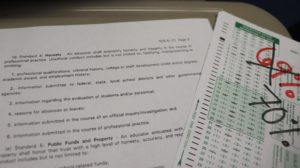Students met with challenging choice: grades or knowledge?
Students at Starr’s Mill have their own goals for their high school careers. Whether they focus more on grades or learning the information taught is up to them.
December 15, 2017
Starr’s Mill High School is known for the phenomenal grades students acquire on statewide tests. Without a doubt, students at the Mill are some of the brightest in the state and are able to accomplish a great deal. The question is whether students really focus on learning the material they are taught for the knowledge or simply for getting a good grade.
Students at the Mill are more focused on getting good grades and the future, rather than focusing on retaining the information for the long term.
“If we are doing our jobs, following the proper curriculum, and doing what we are supposed to be doing than those test scores should be good and they are,” Principal Allen Leonard said.
Teachers at the Mill are here to teach us what we need to know in order to pass the class. They are focused on making sure the student understands the content and develops proper skills.
“Students focus more on grades because getting into colleges and getting scholarships is so competitive and puts so much importance on grades that students have to do what they can to get good grades, which usually means they have to sacrifice actually learning the content,” junior Alivia Sapienza said.
This is a challenge that schools have faced for a long time. Cutting grades out of the school system so that students may only focus on content is not really an option based on the current way that colleges and universities choose students. “I think that when it comes to trying to find that motivating factor for students, it’s difficult because every student is different and so is the perspective of what their goal is from high school,” Leonard said.
“I also think that there is a long and old saying that says that education is wasted on the young,” Leonard said. “Most are here for the grades and what comes after. Of course, there will always be those who are curious and want to learn more. However, those students are generally more focused on certain areas and not everything they learn in school.”
Students spend four years of their lives in high school and in order to make the most of it, they should learn as much as possible. Grades are not leaving the school system but students can certainly take the time to really dive into their studies and try to balance their priorities of getting good grades and retaining the content of each class.
“I am concerned that there is a growing trend right now that everything we do is based on skills, which are obviously really important. If you can’t do anything with the knowledge you have, it doesn’t pay off much, but if we don’t have shared culture and shared cultural knowledge I think we lack things that will unite us culturally,” English teacher Nancy Close said.
Close believes that knowledge and grades work together. Students are interested in knowing things and being engaged in with the world but they also know that their futures depend on receiving good grades so that they may go to college and pursue a career.
When students leave the Mill, they are accompanied by a collection of knowledge that will lead them into their futures. Whether they choose to retain that information or not is ultimately their choice.








